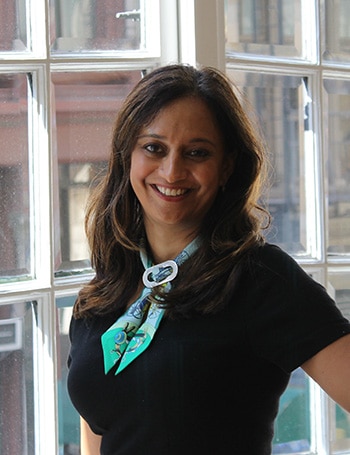Jalak Jobanputra, founding partner of FuturePerfect Ventures, an early-stage venture-capital fund, visitedGlobal Financeto discuss the state of fintech, the future of blockchain and digital currencies, and how corporations can extract more value from such technology.

Global Finance: What is your investment strategy?
Jalak Jobanputra: We invest in decentralized technology and decentralized platforms of the future, including blockchain, artificial intelligence (AI), Internet of things and new ways of connectivity by which people will connect with technology. While most US VCs are US-centric, I am trying to bring global perspective and have made investments around the world—in the Philippines, Mexico, India and Africa, for example. BitPesa, a portfolio company, processes currency transactions using blockchain technology and serves a growing African market for much lower fees and shorter clearing periods [than rivals]. It is popular in places with high currency fluctuations and currency control.
GF: How are banks reacting to the growth of this fintech area?
Jobanputra: Banks and other financial institutions are, in fact, the first to adopt blockchain and AI technology. Blockchain technology and cryptography developed following the financial crisis of 2008 in order to solve problems resulting from traditional banking and centralized finance. Blockchain technology, which is behind bitcoin, can make central and other banks more efficient. Similarly, several central banks are considering creating their own national digital currencies.
GF: What are the main challenges for digital currencies?
Jobanputra: Quantum computing is a risk to blockchain. Servers will get hacked. Also, central banks are worried about the reliability of digital currencies and the ability to control them, especially in countries that are newly integrated into the global economy, such as Kenya. Bitcoin has been used for fraud and also suffers from the notion that there is no physical asset that backs it. In addition, a limited IPO market forces companies to find the right strategic partners and buyers. The regulators have had limited understanding of the crypto community so far, but this is changing.
GF: How can governments and corporations benefit from blockchain technology?
Jobanputra: Governments can use blockchain for public services. Dubai, for example, is developing its “Blockchain 2020” initiative to connect the city via blockchain, including food consumption and solar panels, which will provide more accurate billing and smart contracts. Healthcare will be very much impacted by this technology, as electronic health records and health history can be in the form of an unhackable safe ledger.
With respect to corporations, since blockchain cannot handle a large number of parallel transactions, the focus is on applications that require a high level of accuracy and security of data, and where fraud is common. Existing and potential applications include audit of billing and payments for health services, drug distribution and pharmaceutical records, and food supply, such as China’s pork sector.
A portfolio company, Everledger, provides blockchain solutions for the diamond industry to prevent the sale of counterfeit diamonds, using IBM blockchain permissions. Consumer-goods companies are considering the technology for supply-chain purposes, and media companies, such as Spotify, are trying the technology for direct billing. Tracking real estate titles and associated data is another example.
GF: Blockchain can boost security for banks through enhanced ability to know customers. How can it help ordinary users?
Jobanputra: More than 1.5 billion people globally do not have any form of national ID and they are not part of the formal economic system. Confirming identity biometrically and providing people with digital wallets and a “private key” that will allow them access to different databases can help solve it. That would be critical in an era with a rising number of climate and political refugees. The World Food Programme has been involved in such efforts with food distribution in a Syrian refugee camp.



